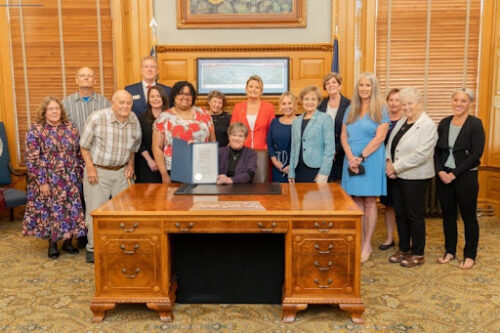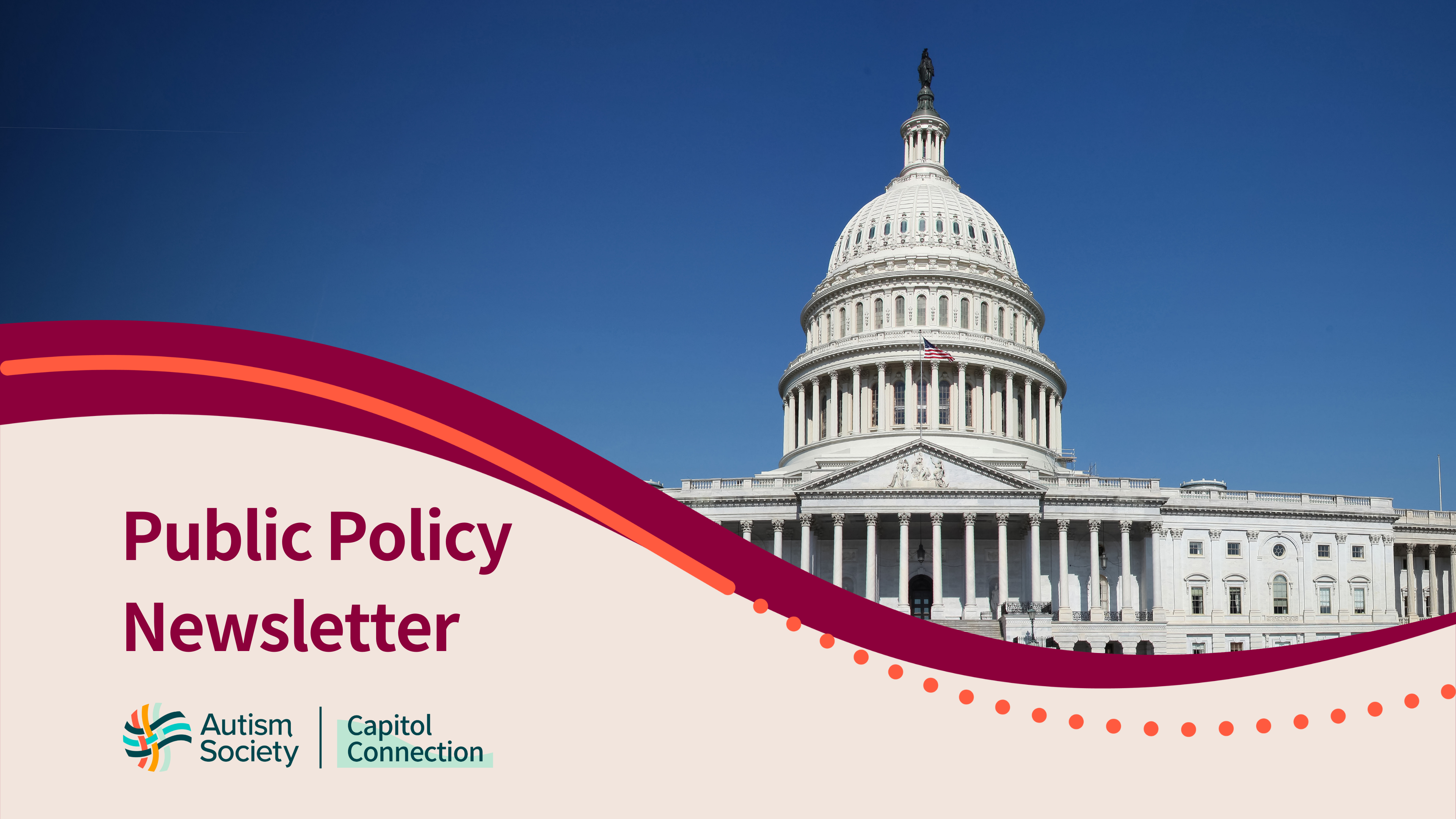
In this issue of Capitol Connection, see Autism Society’s statement regarding the 25th anniversary of the Supreme Court’s Olmstead decision, a new report marking progress resulting from the Autism CARES Act, updates on recent state advocacy wins, and new Department of Education resources.
Supreme Court Olmstead Anniversary
June 22 marks the 25th anniversary of the landmark U.S. Supreme Court decision in Olmstead v. L.C. This historic ruling declared that unjustified segregation of individuals with disabilities constitutes discrimination under Title II of the Americans with Disabilities Act (ADA). Please see the Autism Society’s statement for more information about this ruling. The Autism Society will participate in several celebrations at the White House and Departments of Health and Human Services and Justice.
IACC Autism CARES 2023 Report to Congress
The Interagency Autism Coordinating Committee (IACC) released its annual Autism CARES Act 2023 Report to Congress. This report provides an overview of federal activities related to Autism from FY 2019 to FY 2023. The report provides the legislative background and describes federal agencies’ progress related to screening, diagnosis, and treatment of those with Autism. The Autism CARES Act allocated $1.8 billion for Autism research, education, and training programs through 2024.
Autism CARES Act Reauthorization
Meanwhile, the House Energy and Commerce Committee unanimously passed HR 7213, a bill to reauthorize and improve the Autism CARES Act, on June 12. The bill now goes to the House floor. The Autism Society sent a letter to all Members of the House urging their support as the bill moves to the floor. No schedule has been set for floor action yet. The Senate is expected to introduce a bill to reauthorize the law soon. The Autism CARES Act must be reauthorized by September 30th. Use the Autism Society’s Action Center to educate your Members of Congress about the importance of continuing this law.
Lifespan Respite Care Program Up for Reauthorization
On May 23, the U.S. Senate Committee on Health, Education, Labor & Pensions approved S. 4325, the Lifespan Respite Care Program Reauthorization Act of 2024, which authorizes $50 million over five years. This bipartisan bill, introduced by Senators Baldwin (D-WI) and Collins (R-ME), includes youth under 18 in the definition of family caregivers, making them eligible for services. The Senate bill contrasts with the House version, HR 6160, which does not include caregiving youth. Contact your Members of Congress using the action alert to support S. 4325’s final passage. The Lifespan Respite Care Act provides grants to states to start or expand respite programs.
Higher Education Report
A recent Government Accountability Office (GAO) report shows a rise in college students with disabilities, driven by increased reporting of mental health conditions. In 2020, 21% of college students had disabilities, a significant increase from 10% in 2004. Sixty-nine percent of these students reported behavioral or emotional disabilities, such as depression and ADHD. This report, requested by Senators Hassan (D-NH), Cassidy (R-LA), and Casey (D-PA), emphasizes that students with disabilities are more likely to leave college without a degree than those without disabilities. Senator Casey stressed the need to remove barriers for these students to help them achieve their full potential. The GAO recommends that the Education Department encourage high school students with disabilities to learn how to advocate for college accommodations. The process should also be simplified for colleges to receive guidance on supporting these students.
Empowering People with Disabilities through ABLE Accounts
The U.S. Department of Labor Employment First community of practice hosted a webinar focused on ABLE accounts, part of a national series on employment and financial planning. The webinar covered the benefits of ABLE accounts for people with disabilities, their families, and caregivers. It also explored how employers can incorporate ABLE account benefits to promote inclusion and add new talent. Participants shared how to increase financial independence through ABLE accounts and how providers and self-advocates can support job seekers and employers in understanding accounts. Learn more about these accounts at the ABLE National Resource Center.
Essential Transition Plans for Students with Disabilities
The latest Office of Special Education Services (OSERS) blog: ”Expect, Engage, and Empower: Successful Transitions for All!” emphasizes the importance of individualized transition plans (IEPs and IPEs) for students with disabilities, starting at age 16. These plans, required by IDEA and the Rehabilitation Act, are crucial for success after graduation. The OSERS symposium stresses early understanding of these plans, especially by families. Effective implementation heavily depends on collaboration and discussions between educators. To make a difference, these plans should focus on student’s unique needs. IEPs and IPEs should also be regularly updated to ensure students are achieving goals.
OSEP Fast Facts One Pager
The Office of Special Education Programs (OSEP)[6] released a new OSEP Fast Facts: Children Identified with Autism, which takes an updated look at data on children whose primary disability is Autism. In the 2022-23 school year twelve percent of students identified as having Autism. Additional Fast Facts data is also available.
State Advocacy
Kansas Bill Signing

Advocates in Kansas attending the signing of the Purple Alert with Gov. Laura Kelly
The Autism Society of the Heartland, the Kansas Developmental Disability Council, the Kansas LEND Program, and other advocates were invited to take part in the Purple Alert bill signing with Governor Laura Kelly. This new law ensures individuals with intellectual disabilities are included in missing alerts that are transmitted state-wide.
Illinois Police Training Bill
A bill to mandate police training on how to identify and respond to those with Autism passed in Illinois. The Illinois Law Enforcement Training Standards Board will develop the training with the Department of Human Services. The Autism Society appreciates the many Illinois advocates who helped educate state legislators about the need for this legislation.
Minnesota RISE Act
The Minnesota State Legislature included the Respond, Innovate, Succeed, and Empower (RISE) Act in its higher education reform bill that passed into law. The RISE Act ensures that colleges in the state accept IEPs and 504 plans as proof of disabilities during the accommodation request process. Minnesota is the third state to pass the RISE Act which is based on the federal RISE Act bill (HR2401/ S1071) that has yet to pass.
State Medicaid Guide for Oral Health
Justice in Aging released a brief entitled Medicaid Waivers: A Vehicle to Improve Access to Oral Health and Address Disparities for Older Adults and People with Disabilities. This brief informs advocates of different ways in which states can expand their Medicaid programs to include oral health care. Good oral health can help control or lessen the risk associated with heart disease, diabetes, pregnancy, and other conditions. Unfortunately, oral health care is unavailable and inaccessible for many individuals with disabilities Justice in Aging also held a webinar discussing the brief.
Justice Corner
Federal Findings on Over-Hospitalization of Disabled Children in Rhode Island
The U.S. Departments of Health & Human Services and Justice have found that Rhode Island violated federal civil rights laws by holding children with disabilities for extended periods in Bradly Hospital. According to reports, these stays were unnecessary. The investigation showed that children were hospitalized for long periods of time, sometimes over a year, instead of receiving preferred community-based care. The finding that this constitutes a violation underscores an enforcement of the ADA and Olmstead decision, as well as reaffirming a commitment to providing community-based care for individuals with disabilities. Authorities hope that these findings will lead to better compliance with federal laws and improve care for children with disabilities in the future.
EEOC Sues Maryland Clinic for Disability Discrimination
On May 22, the EEOC sued All Day Medical Care Clinic, LLC, for violating the ADA by terminating an employee with a visual impairment on her first day of work after she asked for reasonable accommodations. The clinic took issue with her not disclosing her disability during the interview and ignored her later communications asking to remain employed. They also neglected subsequent overtures. They also neglected to let her vocational representative install and fund the accommodation. This conduct was determined to breach the ADA, which protects employees from discrimination. The EEOC is thus seeking compensation and preventative measures.
Share:


